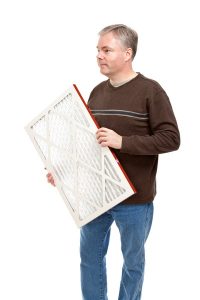 Let’s put it this way—it certainly won’t help your furnace! This is why we recommend to our customers that they replace their air filters every 1-3 months. This isn’t just a random suggestion—doing so will ensure that you get the most effective and efficient use out of your HVAC systems as you can. Considering how much you’ve likely already used your furnace this winter, we’d venture to guess that you’d like to do whatever you can to prevent costly heater repair in Fairfax, VA.
Let’s put it this way—it certainly won’t help your furnace! This is why we recommend to our customers that they replace their air filters every 1-3 months. This isn’t just a random suggestion—doing so will ensure that you get the most effective and efficient use out of your HVAC systems as you can. Considering how much you’ve likely already used your furnace this winter, we’d venture to guess that you’d like to do whatever you can to prevent costly heater repair in Fairfax, VA.
One way to help with this is by performing one small DIY maintenance task—changing out your air filter. You might be surprised to find just how important this little HVAC component is. It does more than protect your indoor air quality (actually, that’s not even its intended purpose)—it protects the system itself.
An Air Filter’s Purpose
As we mentioned above, your furnace’s air filter isn’t actually in place to protect the quality of your indoor air. Its goal is to protect the inside components of your furnace itself. Today’s air filters are designed to optimize air quality as much as possible. But, because your furnace’s blower fan sucks in air at such a high speed, it also has the potential to suck in heavy amounts of debris.
Dirt and other particulates in the air of your home could damage the furnace system, pummeling it with that debris. The filter is in place to protect your furnace form these particles, and a dirty or clogged furnace will certainly begin experiencing problems.
The Problem with a Dirty Air Filter
Both your forced-air heating and cooling systems are designed to take in a set amount of air with each cycle it goes through. This airflow helps to ensure you’re always comfortable within your home, but also that the heater or air conditioner’s motor doesn’t run for too long. So when dirt and debris clog up the filter and won’t allow the right amount of air through, the system suffers.
Not only will you feel less comfortable due to a lack of airflow, but you’ll also find yourself paying more and more to even utilize your HVAC system. As a result, it will run nonstop to compensate, resulting in higher monthly bills. A dirty air filter can also lead to serious repair needs, to resolve problems like:
- Short-cycling
- Overheating
- Emergency Furnace Repairs
- Freezing Coils
Changing Your Furnace Filter
The good news is you can avoid paying to resolve any of these problems, just by changing your air filter on a regular basis. Air filters are generally affordable, and it’s possible to stock up on enough for a year from your local hardware store. But how do you actually go about changing it?
Your furnace air filter is usually located in a marked point near your air handler, and there are arrows directing you on what direction to put the filter in. If you have questions or concerns, you can, of course, reach out to our team and we will be happy to help.
Permanent air filters are also an option, but it is important to note that these must be cleaned (with a low-pressure hose, in order to prevent damaging the filter) every 1-3 months and should be completely dry before you put them back in your furnace. Otherwise, you risk the growth of mold and mildew within your HVAC system.

